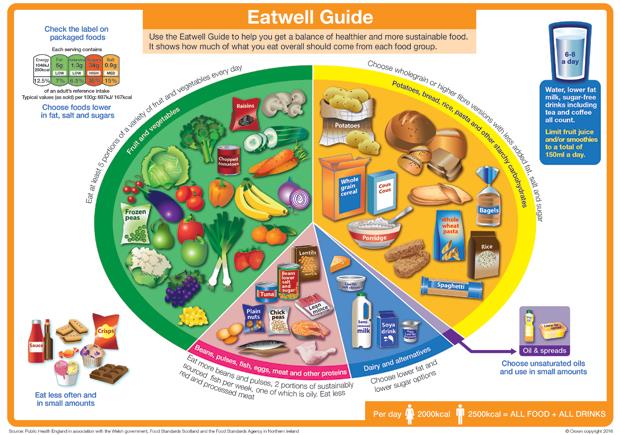Whether you are trying to lose, gain or maintain your weight, eating the right amount of food is important to help you achieve your goal. I use the palm of my hand as a guide so when I am having carby foods such as rice or potatoes, I keep the amount to the size of my palm or less. Same rule applies for my proteins like meat. Vegetables are different, I usually fill the rest of my plate with vegetables especially dark leafy green vegetables such as spinach and kale etc. In the Eatwell Guide the government recommend that carbs should make up a third of what we eat but personally I don’t agree. We do not necessarily need carbs to survive and being diabetic I have found the less carbs I consume the easier my diabetes is to manage. Try and get into the habit of dropping the carbs a little lower and when having them always try to eat high fibre wholegrain cereals, wholemeal pasta and bread and brown rice. These carbohydrates contain more fibre and won’t spike your blood sugar level as high as the white variety but still limit your intake as they are still carbs and carbs are a diabetics enemy. Your proteins are important to help you grow and repair but you should try to eat lean cuts of meat and go for white meat over red and never remove the skin from chicken as this contains monounsaturated fats in the form of oleic acid which is found in olive oil and it is good for your cholesterol. I have also totally removed pork from my diet as it always gave me chronic indigestion but if you love pork stick to lean cuts of pork like tenderloins, loin chops and sirloin roast as other cuts like bacon for example are high in artery-clogging saturated fat and cholesterol and shouldn’t be eaten every day. Beans, peas and lentils are a low fat, high protein alternative to meat which I have added regularly to my diet. Eggs are a great source of protein but have them boiled or poached rather than fried. Experts suggest eating oily fish twice a week for essential fatty acids (Omega 3) but if your like me and cannot stand fish unless its wrapped in batter and swimming in vinegar there are other ways to get your recommended daily intake of omega 3, like kale, flaxseed, hemp seeds, chia seeds, soy products and yummy walnuts.
Try and eat fewer pastry goods like pies and pasties. Same goes for crisps, biscuits, ice cream, cakes and chocolate. Of course have a little treat now and again but limit yourself and be strict as these foods will only make your weight and blood sugar rocket. Dairy foods like butter, cream and yoghurts are ok in moderation, but always be aware of the sugar content especially with flavoured yoghurts. Since starting to eat cleanly I have learnt a few things about how certain manufacturers market their products, especially the “healthy low fat” foods. I have learnt to stay away from lower fat options as this usually means they have removed the fat and replaced it with chemicals and sugar to keep it tasting nice, so please be aware of their marketing strategies and always read the labels. I love a big dollop of full fat greek yoghurt, a teaspoon of honey and a few strawberries, it’s a perfect little sweet treat.
I know its hard to reduce your portion sizes especially when your so used to eating a certain amount at meal times but if your trying to lose weight and drop your sugar levels down and nothing seems to be working then you need to look at just how much food your actually consuming each day and adjust it accordingly. Eventually you will get used to the smaller portions and going back to eating what you did, will make you feel full and bloated. I remember when I was 19 stone, I would go to my Mams for Sunday lunch and the mashed potato was piled so high on my plate that I wouldn’t even know who was sitting opposite me until I was half way through it.
Everyone needs to eat about every four to six hours during the day to keep energy levels up. People with type 2 diabetes usually have better blood glucose control if their meals are spaced evenly throughout the day. Too many carbs at any one time can raise your blood sugar too high, even if your taking diabetes medicine. So many people tend to skip breakfast, have a small lunch, and then eat far too much in the evening. A person with diabetes should attempt to eat about the same amount of carbohydrates at each meal. Just remember the less carbs the better as carbs are sugar, starches and fibre found in foods.
Breakfast is especially important if you need to control your weight. It helps to kick off your metabolism, making you less likely to overeat later. If you are unusually active or on fixed doses of medication, you may need a snack. Monitoring your blood glucose will help you to decide that. Speak to your GP as your medication can be adjusted so you do not need snacks if you are concerned about putting on weight.


